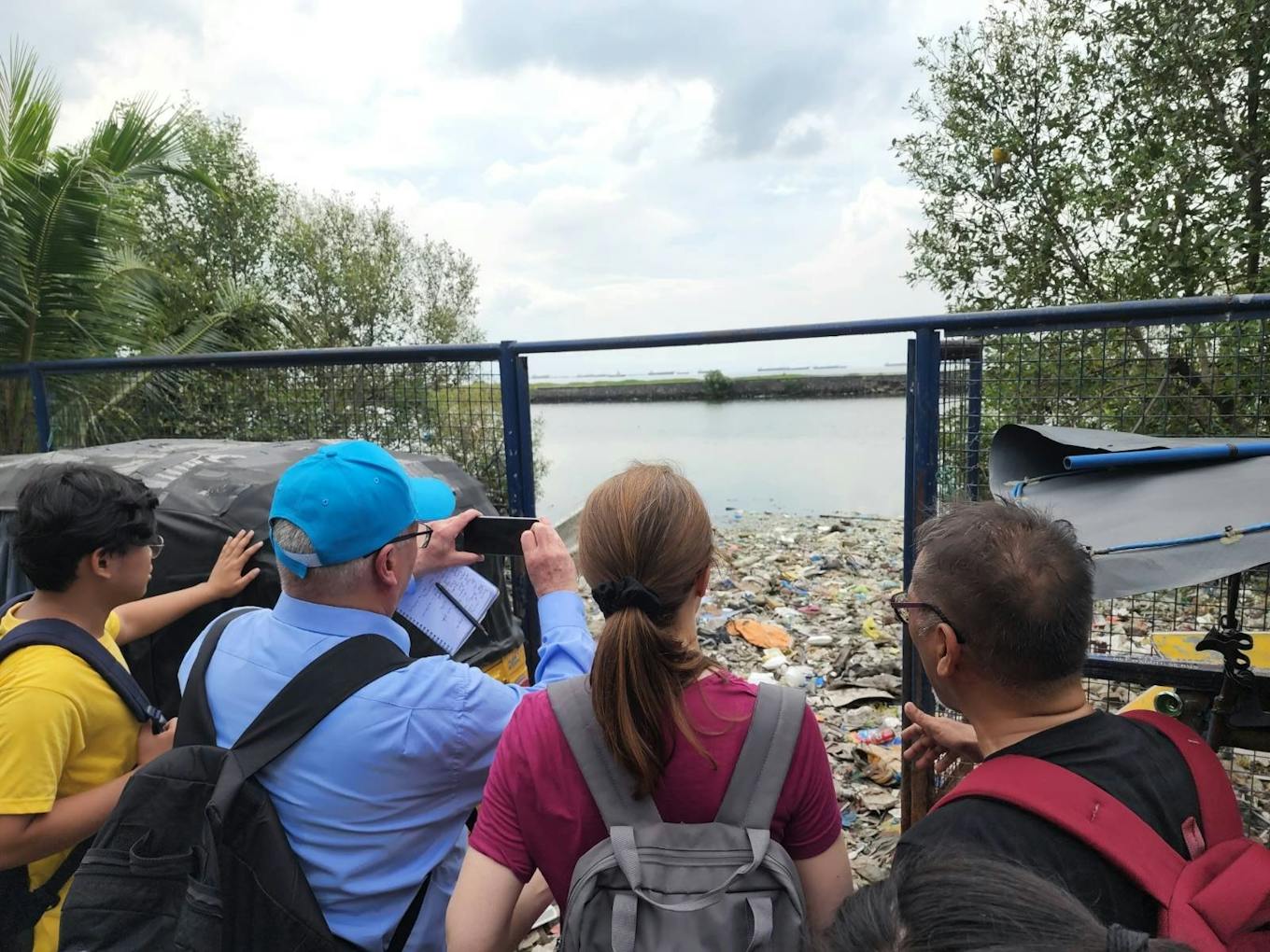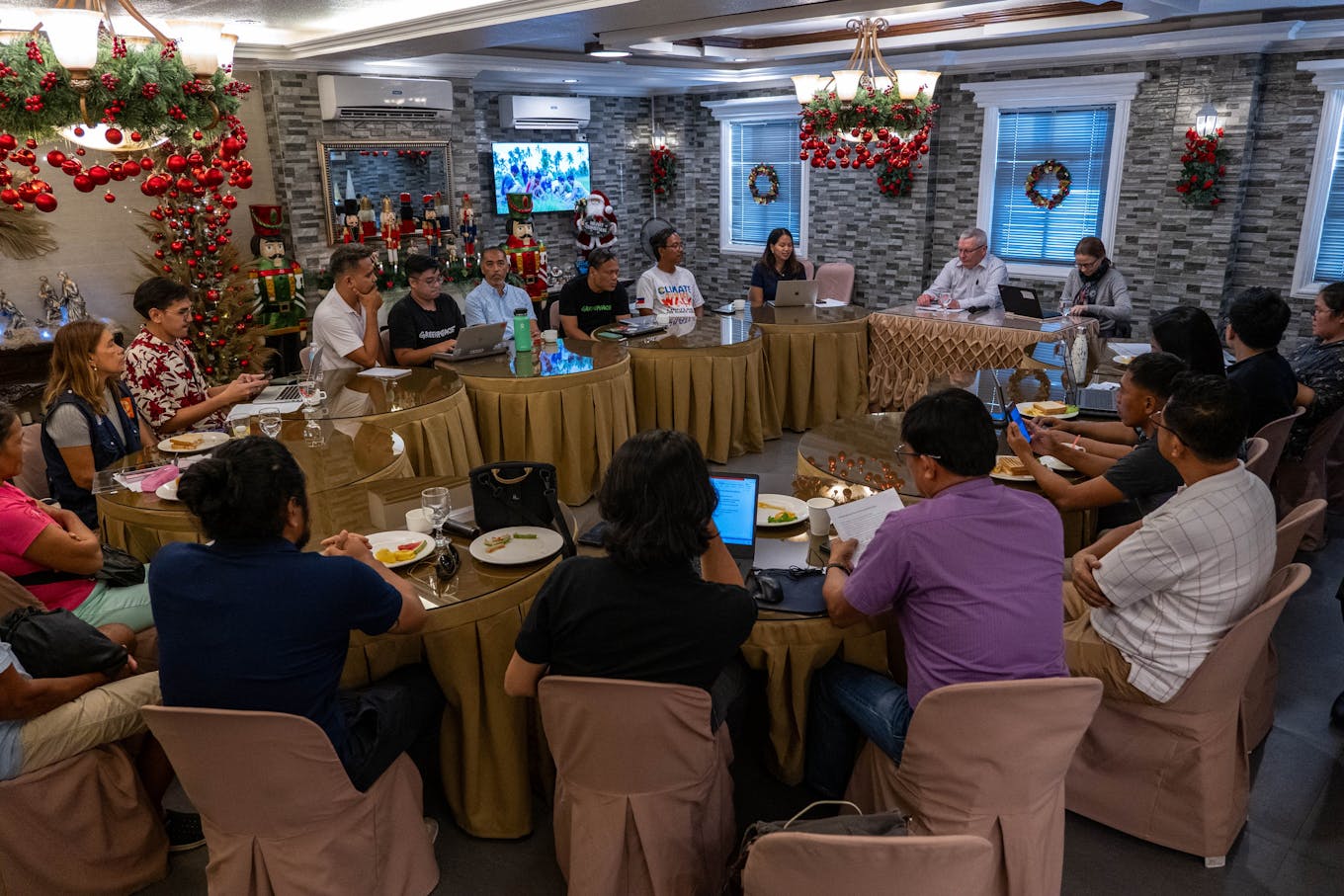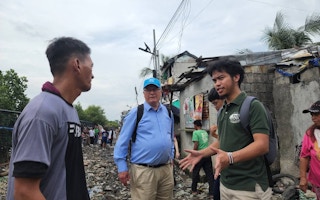Australian environmental law and policy expert Ian Fry last visited the Philippines in the mid-1990s when he attended a workshop on forest conservation as part of a global coalition.
To continue reading, subscribe to Eco‑Business.
There's something for everyone. We offer a range of subscription plans.
- Access our stories and receive our Insights Weekly newsletter with the free EB Member plan.
- Unlock unlimited access to our content and archive with EB Circle.
- Publish your content with EB Premium.
Since then, he has joined several other green organisations and has served the Tuvalu government as its ambassador for climate change and environment. He represented the Pacific Island country in various international climate change conferences, including at the COP talks for more than 20 years.
This month, Fry returned to the Philippines as the United Nations special rapporteur tasked to observe issues on human rights in the context of climate change. His job is to make policy recommendations to nations he visits even if he cannot coerce governments to apply the recommended changes.
Before the Philippines, Fry had visited two other countries – Honduras and Bangladesh – after his appointment in May 2022 by the UN human rights council.
In the Philippines, he chose to go to what he believed were the most climate-vulnerable areas in the country like urban poor coastal communities in Metro Manila as well as calamity-stricken places in Leyte and Iloilo City in the Visayas region.
Fry went to the Bataan Shipping Engineering Company compound (Baseco) which lies on almost 50 hectares of poorly reclaimed land around Manila Bay. He spoke to fisherfolk communities about how continuous dredging activities in the bay have affected their livelihood, despite Philippine president Ferdinand Marcos, Jr ordering the suspension of all coastal land reclamation projects in the area.

UN special rapporteur on climate change and human rights Ian Fry takes a photo of a strip of reclaimed land in Manila Bay, on the coast of the urban poor neighbourhood of Baseco compound. Image: Kalikasan PNE
He also flew to Tacloban City in Leyte, the site of Typhoon Haiyan, the deadliest storm to hit the country. He spoke to civil society organsations, which showed him places that would reveal prevailing environmental threats in the aftermath of the storm. These include a government-planned reclamation project that many fear will impact surrounding mangroves, which are thriving once again despite being once destroyed by the supertyphoon.
In Iloilo, he met with community leaders to discuss the ongoing construction of the Jalaur Dam, blamed for the killings in 2021 of nine Indigenous People who went against the project to protect their ancestral lands.
At the end of his tour, he said he learnt about the “horrific” ways environmental defenders were either abducted or killed by the military, prompting him to call for the abolition of the government’s NTF-ELCAC (National Task Force to End Local Communist Armed Conflict), a taskforce started by former Philippine president Rodrigo Duterte as part of his counter-insurgency efforts.
Since President Marcos, Jr assumed office in June last year, there have been at least 15 cases of reported abductions of community organisers and environmental activists, including two youth leaders who were opposing the Manila Bay reclamation.
He presented his findings from his 10-day visit to the government, but will submit a formal report to the Human Rights Council in June next year.
In this interview with Eco-Business, the climate expert talks about why he feels strongly about disbanding the anti-insurgency task force, the dangers of reclaimed land, and why it is crucial for President Marcos, Jr to attend the upcoming COP28.
This is your third country visit as UN special rapporteur. When considering human rights in the context of climate change, how does the Philippines compare to the two other places you have been to?
I visited Honduras in September this year, and then Bangladesh last year.
There are similarities with the Philippines, particularly with Honduras, because they have issues with the treatment of environmental human rights defenders. I met with some community groups which had been subjected to various forms of violations by the military and private institutions because of their opposition to dams and mines.
For Bangladesh, there are similarities with the Philippines in connection to floods.
These three countries all share high vulnerability to the impacts of climate change.
Former UN special rapporteur Vicky Tauli Corpuz said that the Philippines by far has the worst human rights violations in the world in terms of environmental defenders. Do you agree?
As far as the countries I have visited are concerned, yes. I think perhaps the Philippines is just behind Brazil in the number of deaths of environmental human rights defenders.
I had a number of meetings with civil society organisations and Indigenous Peoples in all the places I visited in the Philippines, and nearly everybody I spoke to had been red tagged (which refers to the malicious blacklisting of individuals who are critical of the government). There were horrific stories of people, who have either been abducted or harassed by the military. I heard of extrajudicial killings of people. This is a major concern. The national taskforce is clearly moving way beyond its mandate.
One of your recommendations was to disband the taskforce. Do you think it will solve the country’s human rights issues?
It won’t solve everything but it will certainly fix a huge problem. This taskforce seems to be out of control. It is not doing what it was originally established to do and therefore abolishing the task force will certainly go a long way in getting the government to rethink what it needs to do. It needs to deal terrorism, rather than deal with other people who are not related to terrorism at all.
What are some of the “horrific stories” you heard?
Nine [Indigenous] People were killed extrajudicially and there hasn’t been any real investigation into the causes of their death and who was behind it.
One of the recommendations that I made to the government was to set up a truth and reconciliation process, so that there can be a proper hearing into these extrajudicial killings, bring people before the court system, [find out] who are responsible for these killings, and consider what sort of reparations should be provided to the families of these people who have been killed.
You observed during your visit that the Philippines has good climate laws, but is lacking in implementing them. What makes you say that?
The Philippines has the Climate Change Act – which acknowledges the country’s vulnerability to climate change and the need for appropriate adaptation – but it goes back to 2009 so it needs to be revisited.
There is the climate accountability bill, which is currently pending in Congress and that deals with the issue of carbon majors. I think that this issue needs to be legislated.
While the government has quite good legislation and it mainstreams gender issues within its planning processes, there isn’t been a lot of action on the ground. This country has one of the highest rates of people displaced by climate change in the world. There is a large number of people internally displaced as a consequence of climate change, which affects people’s lives dramatically. In the development of hydroelectric dams, minerals, particularly transition minerals, that are in high demand globally for electric vehicles and for electric batteries, there needs to be careful consideration of how they should be developed, without human rights violations.

UN special rapporteur on climate change and human rights Ian Fry (right of table in the centre), holds a dialogue with environmental defenders, civil society groups, and survivors of Typhoon Haiyan in Tacloban City, Leyte, in the Philippines on 10 November 2023. Image: Living Laudato Si
Upon seeing the impacts of reclamation and dredging, you also recommended for the government to enforce a moratorium on all coastal land reclamation projects nationwide, especially in Manila Bay, and including another one planned in Tacloban. Tell us more about it.
I spoke to fisherfolk in Manila Bay and their livelihoods are seriously affected by the land reclamation projects there. Dredging sand exacerbates some of the impacts of typhoons so there are serious implications around that sort of work.
There are also hard engineering proposals in some of the places I visited like in Tacloban. The government wants to build a concrete wall [on the Cancabato Bay] and fill up some part of the bay with concrete.
But we learnt this lesson in Tuvalu that if you build a seawall and the waves go over those walls, you trap the water which will have a significant ecological impact that affects groundwater supplies, like mangroves.
Mangroves play a critically important role in dissipating the energy of storm surges. If you remove them, you are making coastal communities more vulnerable to the impacts of climate change. These sorts of reclamation projects need to be carefully considered.
Shifting to a more global topic, you are attending the upcoming COP28. Loss and damage will be one of the main agenda items of the Filipino delegation. How do you think President Marcos, Jr can take a more active role in the talks, even if he does not go in person?
I did hear that the President would be attending the upcoming COP to launch the national adaptation plan. I sincerely hope that he does attend and become actively involved in the negotiations on the loss and damage finance facility.
Those negotiations are not going well.
During the time I was in the Philippines, the transitional committee met and came up with a tax proposal, which I think has serious problems. There are also no specific requirements to consider human rights in the outcome document. There are issues around the World Bank being the trustee for this fund, which I think brings a lot of inherent problems based on my long experience in climate change negotiations.
At the beginning of the COP, there will be a high level segment where heads of states will be able to make a statement. President Marcos needs to give a clear signal to the COP president that the Philippines is not satisfied with the current outcome of this loss and damage fund and it will do a huge disservice to the most vulnerable countries like the Philippines, if it goes through in its current form.
He needs to clearly signal that more needs to be done. I think it is much better that we allow more time for proper consideration of the modalities of the fund, rather than just pursue a quick solution.
Want more Philippines ESG and sustainability news and views? Subscribe to our Eco-Business Philippines newsletter here.

















